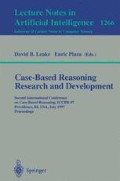Abstract
Case-based reasoning depends on multiple knowledge sources beyond the case library, including knowledge about case adaptation and criteria for similarity assessment. Because hand coding this knowledge accounts for a large part of the knowledge acquisition burden for developing CBR systems, it is appealing to acquire it by learning, and CBR is a promising learning method to apply. This observation suggests developing case-based CBR systems, CBR systems whose components themselves use CBR. However, despite early interest in case-based approaches to CBR, this method has received comparatively little attention. Open questions include how case-based components of a CBR system should be designed, the amount of knowledge acquisition effort they require, and their effectiveness. This paper investigates these questions through a case study of issues addressed, methods used, and results achieved by a case-based planning system that uses CBR to guide its case adaptation and similarity assessment. The paper discusses design considerations and presents empirical results that support the usefulness of case-based CBR, that point to potential problems and tradeoffs, and that directly demonstrate the overlapping roles of different CBR knowledge sources. The paper closes with general lessons about case-based CBR and areas for future research.
This work was supported in part by the National Science Foundation under Grant No. IRI-9409348.
Preview
Unable to display preview. Download preview PDF.
References
D. Aha and D. Wettschereck. Case-based learning: Beyond classification of feature vectors. Call for papers of ECML-97 workshop, 1997.
[Birnbaum et al., 1991] L. Birnbaum, G. Collins, M. Brand, M. Freed, B. Krulwich, and L. Pryor. A model-based approach to the construction of adaptive case-based planning systems. In R. Bareiss, editor, Proceedings of the DARPA Case-Based Reasoning Workshop, pages 215–224, San Mateo, 1991. Morgan Kaufmann.
J. Carbonell. Learning by analogy: Formulating and generalizing plans from past experience. In R. Michalski, J. Carbonell, and T. Mitchell, editors, Machine Learning: An Artificial Intelligence Approach, pages 137–162. Tioga, Cambridge, MA, 1983.
K. Hammond. Case-Based Planning: Viewing Planning as a Memory Task. Academic Press, San Diego, 1989.
K. Hanney and M. Keane. The adaptation knowledge bottleneck: How to ease it by learning from cases. In Proceedings of the Second International Conference on Case-Based Reasoning, Berlin, 1997. Springer Verlag.
T. Hinrichs. Problem Solving in Open Worlds: A Case Study in Design. Lawrence Erlbaum, Hillsdale, NJ, 1992.
L. Hunter. Planning to learn. In Proceedings of the Twelfth Annual Conference of the Cognitive Science Society, pages 261–268, Cambridge, MA, July 1990. Cognitive Science Society.
A. Kass. Developing Creative Hypotheses by Adapting Explanations. PhD thesis, Yale University, 1990. Northwestern University Institute for the Learning Sciences, Technical Report 6.
A. Kennedy. Using a domain-independent introspection mechanism to improve memory search. In Proceedings of the 1995 AAAI Spring Symposium on Representing Mental States and Mechanisms, pages 72–78, Stanford, CA, March 1995. AAAI Press. Technical Report WS-95-05.
J. Kolodner. Retrieval and Organizational Strategies in Conceptual Memory. Lawrence Erlbaum, Hillsdale, NJ, 1984.
J. Kolodner. Case-Based Reasoning. Morgan Kaufmann, San Mateo, CA, 1993.
[Leake et al., 1996] D. Leake, A. Kinley, and D. Wilson. Acquiring case adaptation knowledge: A hybrid approach. In Proceedings of the Thirteenth National Conference on Artificial Intelligence, pages 684–689, Menlo Park, CA, 1996. AAAI Press.
D. Leake, A. Kinley, and D. Wilson. Case-based similarity as sessment: Estimating adaptability from experience. In Proceedings of the Fourteenth National Conference on Artificial Intelligence. AAAI Press, 1997.
D. Leake, A. Kinley, and D. Wilson. Learning to integrate multiple knowledge sources for case-based reasoning. In Proceedings of the Fourteenth International Joint Conference on Artificial Intelligence. Morgan Kaufmann, 1997. In press.
D. Leake. Evaluating Explanations: A Content Theory. Lawrence Erlbaum, Hillsdale, NJ, 1992.
Ashwin Ram. AQUA: Asking questions and understanding answers. In Proceedings of the Sixth Annual National Conference on Artificial Intelligence, pages 312–316, Seattle, WA, July 1987. Morgan Kaufmann.
F. Ricci and P. Avesani. Learning a local similarity metric for case-based reasoning. In Proceedings of the First International Conference on Case-Based Reasoning, pages 301–312, Berlin, October 1995. Springer Verlag.
Michael Richter. The knowledge contained in similarity measures. Invited talk, the First International Conference on Case-Based Reasoning, Sesimbra, Portugal., October 1995.
B. Smyth and M. Keane. Remembering to forget: A competence-preserving case deletion policy for case-based reasoning systems. In Proceedings of the Thirteenth International Joint Conference on Artificial Intelligence, pages 377–382, Montreal, August 1995. IJCAI.
B. Smyth and M. Keane. Design à la Déjà Vu: Reducing the adaptation overhead. In D. Leake, editor, Case-Based Reasoning: Experiences, Lessons, and Future Directions. AAAI Press, Menlo Park, CA, 1996.
K. Sycara. Using case-based reasoning for plan adaptation and repair. In J. Kolodner, editor, Proceedings of the DARPA Case-Based Reasoning Workshop, pages 425–434, San Mateo, CA, 1988. Morgan Kaufmann.
M. Veloso and J. Carbonell. Variable-precision case retrieval in analogical problem solving. In R. Bareiss, editor, Proceedings of the DARPA Case-Based Reasoning Workshop, pages 93–106, San Mateo, 1991. Morgan Kaufmann.
M. Veloso. Planning and Learning by Analogical Reasoning. Springer Verlag, Berlin, 1994.
[Wilke et al., 1997] W. Wilke, I. Vollrath, K.-D. Althoff, and R. Bergmann. A framework for learning adaptation knowedge based on knowledge light approaches. In Proceedings of the Fifth German Workshop on Case-Based Reasoning, 1997.
Author information
Authors and Affiliations
Editor information
Rights and permissions
Copyright information
© 1997 Springer-Verlag Berlin Heidelberg
About this paper
Cite this paper
Leake, D.B., Kinley, A., Wilson, D. (1997). A case study of case-based CBR. In: Leake, D.B., Plaza, E. (eds) Case-Based Reasoning Research and Development. ICCBR 1997. Lecture Notes in Computer Science, vol 1266. Springer, Berlin, Heidelberg. https://doi.org/10.1007/3-540-63233-6_507
Download citation
DOI: https://doi.org/10.1007/3-540-63233-6_507
Published:
Publisher Name: Springer, Berlin, Heidelberg
Print ISBN: 978-3-540-63233-7
Online ISBN: 978-3-540-69238-6
eBook Packages: Springer Book Archive

